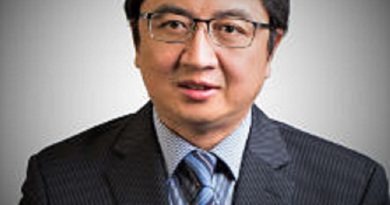U.S. Ambassador to the United Nations Linda Thomas-Greenfield Speaks at Seton Hall
Shweta Parthasarathy & Jasmine De Leon
Digital Editor & Staff Writer
On April 12, United States Ambassador to the United Nations Linda Thomas-Greenfield addressed Seton Hall University students, faculty, and alumni at the School of Diplomacy and International Relations’ first World Leaders Forum event since 2019. Ambassador Thomas-Greenfield’s visit was an initiative of the School of Diplomacy’s Diversity, Equity, Inclusion, and Justice (DEIJ) Coalition. She discussed a range of topics, including the Ukraine-Russia conflict, vaccine inequality, climate change, women’s leadership, and her experiences in the Foreign Service.
The first topic discussed was the war between Russia and Ukraine, specifically the U.S.’s goals and its attempts to employ diplomacy to mitigate the conflict. The Ambassador described the U.S.’s goal as simply to force “him [Putin] to cease his attacks on the Ukrainian people,” by pressuring and isolating Russia within the United Nations, especially in the Security Council and the General Assembly.
At the same time, Ambassador Thomas-Greenfield said that the U.S. is supporting Ukraine “morally and politically in the UN, but also materially.” Although attempts to bring Russia to the table and discuss their security concerns in Ukraine “did not succeed,” Ambassador Thomas-Greenfield explained that she remains steadfast in her commitment to diplomacy: “We have not given up on diplomacy.”
The Ambassador also spoke about limitations on access to COVID-19 vaccines and what measures the U.S. has employed thus far to provide access. Individuals in many developing nations are still facing difficulties with access to the COVID-19 vaccine, despite developed nations providing some doses through systems such as COVID-19 Vaccines Global Access (COVAX). The Ambassador identified the lack of necessary infrastructure as a key reason for vaccine inequality. “We’re sending over vaccines, but the infrastructure is not there,” Ambassador Thomas-Greenfield said. “We need to see the vaccines get delivered, get stored, and in people’s arms.”
She further explained that the priority of the U.S. and other developed nations should be to provide countries with the resources necessary to internally produce and distribute vaccines safely, effectively, and equitably.
Ambassador Thomas-Greenfield also addressed the global fight against climate change and the disparate responses of developing and developed nations. She made clear that the fight against climate change requires constant conversations and a willingness to provide the resources for countries to develop. “It is not an easy conversation to have with countries that are still developing,” she stated. The Ambassador emphasized that she, the U.S. government, and other international entities remain committed to continuing conversations.
The Ambassador also shared her experience working to fight deforestation in Liberia, a developing nation that houses one of the only remaining rainforests in Africa. Deforestation in the state is necessary for farmland and to support coal production, so when other governments offered money in exchange for saving the remaining trees, according to the Ambassador, they were told, “you may need our trees, but our farmers need land.”
The Ambassador also described her unique approach to informal diplomacy, known as ‘Gumbo Diplomacy.’ She shared that as a child, she would cook with her grandmother three meals a day for over 500 people at a Salvation Army camp. Drawing on those childhood experiences, Ambassador Thomas-Greenfield cooks gumbo at her house for visiting dignitaries, such as Liberian President and Nobel Peace Prize recipient Ellen Johnson Sirleaf, and former U.S. Secretary of State Condoleezza Rice.
Not only does Ambassador Thomas-Greenfield use gumbo and cooking with visitors as diplomatic tools, but she also views gumbo as a metaphor for diplomacy. “Food is diplomacy,” she said. “You bring people together.” She explained that when making gumbo, “you put a lot of different things together that might not go together,” but the resulting dish is delicious. Similarly, in international diplomacy, “you don’t always agree, but you become friends and you blend.”
One panelist asked Ambassador Thomas-Greenfield about how her Americanness is questioned because she is a Black woman. The Ambassador responded that she has always been comfortable in her own skin. “I know who I am. I know who I represent,” Ambassador Thomas-Greenfield stated. “I encourage people to be comfortable with who you are.”
The final topic of the morning was Ambassador Thomas-Greenfield’s career experiences and advice for the undergraduate and graduate students present. When Ambassador Thomas-Greenfield was asked to give advice to her younger self on how to navigate the foreign service as a woman and person of color, she stated “do not limit yourself.”
“I think there was a period when I came into the foreign service when I let myself define my limitations instead of defining my potential. Let other people try to limit you, and fight them,” she said.
Ambassador Thomas-Greenfield, nominated by President Biden, was confirmed as the Representative of the U.S. to the UN in 2021 after her 35-year career with the U.S. Foreign Service ended in 2017. Prior to her appointment as Ambassador, she served as Assistant Secretary of State for African Affairs, Director General of the Foreign Service, and Director of Human Resources. Among other positions, Ambassador Thomas-Greenfield also previously served as Ambassador to Liberia and held postings in Pakistan, Kenya, The Gambia, Nigeria, and Jamaica.


